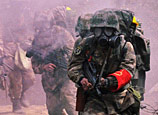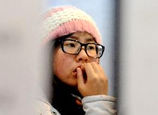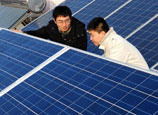
By studying data from air-quality monitoring stations and records of hospital visits, plus medical and mortality records, the system will provide specific warnings and advice to help the public to protect themselves, explained Xu, although she was unable to provide an exact timetable.
The network will start in Beijing, before being rolled out nationwide as the air-quality monitoring data become more widely available across the mainland, she said. "The health impact of the fine particulates varies regionally and among differing population groups."
Red light spells danger
"My friends and I have started to make jokes along the lines of 'Right now, it's healthier to smoke in Beijing than to breathe the air,'" said Camille Chanlair, a French national who has lived in the city since 2008. "They all avoid going out when they see the pollution. Some have bought air purifiers," he added.
"This is no joke, people! This is serious stuff. You should not be outside right now with your children. Everyone should be taking it easy and avoid going outside," wrote Richard Saint Cyr, a general practitioner at a private hospital in Beijing, in a warning posted on his micro blog before he left work on Saturday evening.
Saint Cyr, who has lived in China for six years, said his clinic has a good air filter system. His 200-square-meter home is also equipped with three air purifiers. "Honestly, with this high level (of pollution) even three purifiers won't really be effective. But at least I can close my bedroom door overnight," said the US national.
Zhang Bo, general manager of Beijing Jijian Science & Technology Development Co, said the three air purifiers at his home in Beijing are so overloaded that the red lights (indicating heavy pollution) can't be disarmed.
"It usually takes each machine an average of one hour to purify the air (in one room). When that's done, the red light turns green. Now, it stays red all the time," he said, adding that the pollution is so bad that he won't venture out of doors if he can avoid it.
Saint Cyr said he has seen an unusually high number of people arriving at the clinic complaining of bad coughs and breathing and pulmonary problems. Most feel better after being treated with cough syrup, but the doctor emphasized that the best treatment is to avoid exposure to the pollutants.
"At these levels, people of all ages should really avoid going outside, if possible. These types of pollution spikes can be deadly for very sick and fragile people who are already weak from illness. Anyone with a normal cold or flu will find it much harder to recover quickly in this polluted atmosphere," he said.


















 China's social trust index declined further last year, according to the Annual Report on Social Mentality of China 2012
China's social trust index declined further last year, according to the Annual Report on Social Mentality of China 2012


![]()
